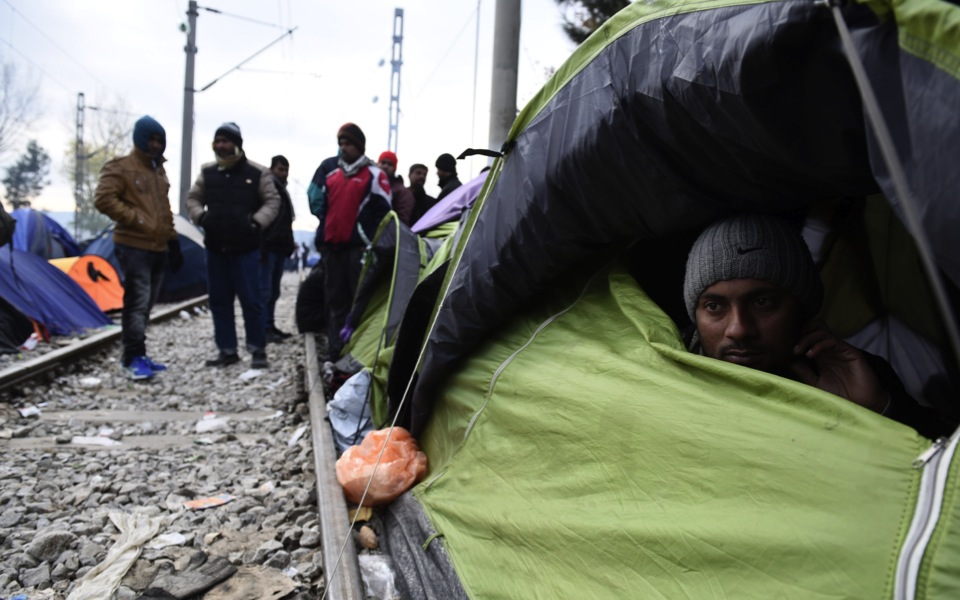Greece faces Schengen threat amid refugee impasse

As Greece comes under intense pressure to tighten its borders, authorities are still grappling with a relentless influx of migrants.
Pressure on Greece appeared to grow on Tuesday as senior EU officials warned that the country faces suspension from the Schengen passport-free travel zone unless it overhauls its response to the crisis by mid-December.
“The Germans are furious and that’s why people are talking about pushing Greece out,” an anonymous EU ambassador was quoted by the FT as saying noting growing frustration about Athens’s failure to meet its obligations.
Meanwhile, as thousands of migrants gathered near Greece’s border with the Former Yugoslav Republic of Macedonia, seeking passage, Migration Minister Yiannis Mouzalas said that those unable to cross would be able to return to Athens.
He also expressed concern about a protest on the border that has closed the railway line connecting the two countries.
A total of 1,800 cargo carriages are being affected by a migrant protest on Greece’s northern border with FYROM that has already cost railway operator Trainose more than 1.5 million euros, the company said Tuesday.
About 1,500 migrants – mainly from Iran, Pakistan and Morocco – have since November 18 camped on the railway lines connecting the two countries demanding passage to western Europe, stranded by a policy of filtering migrants in the Balkans.
Major international companies such as Cosco, Hewlett Packard and Sony have voiced concerns about the shutdown ahead of Christmas season. The holdup has also affected Greek exporters.
The Association of International Freight Forwarders and Logistic Enterprises of Greece on Tuesday urged Infrastructure Minister Christos Spirtzis to find a solution to the problem.
“This is hurting companies which are struggling to survive and, most importantly, to fulfill their obligations to other firms, domestic as well as multinationals,” the association said in a letter.
“You ought to help the Greek businesses which today support the economy because tomorrow it may be too late,” it said.
Companies can reroute their cargo through Bulgaria, an option which costs money and time.
Meanwhile, about 1,000 non-Syrians, Iraqis and Afghans who were turned back by FYROM police returned to Athens Tuesday. Bus transfers were organized by UNHCR.
In comments on Tuesday, Migration Ministry General Secretary Vasilis Papadopoulos made clear that authorities do not plan to build a reception facility for migrants and refugees in Idomeni, near the border.
Returning migrants are set to be accommodated at the a former Olympic hockey stadium near the old Athens airport – a decision which prompted a reaction from the local municipality.
Speaking to Kathimerini, Elliniko mayor Ioannis Konstantantos said that authorities had pledged that the venue would be evacuated by end October.
UNHCR is seeking about 7,000 apartments and hotel rooms to accommodate some 20,000 asylum seekers eligible for the EU’s relocation program by the end of the year. Greece is to see 66,400 people relocated under the Commission’s plan.
Officials are concerned about a large number of migrants remaining stranded in Greece.
Meanwhile, a group of 56 undocumented immigrants from Pakistan are expected to be repatriated on Wednesday in the first such operation in over 18 months. The deportation was originally set to take place on November 5 but the flight was cancelled after Pakistani authorities refused to issue permission for landing.
Despite an earlier deal with the Greek government, Islamabad said it would only take in nationals with a proper Pakistani ID and refuse entry to those with passports issued by the country’s embassy in Athens.
Also on Tuesday, Supreme Court prosecutor proposed the extradition to the United States of a Syrian national accused of forging identity papers. A decision is expected next week.





